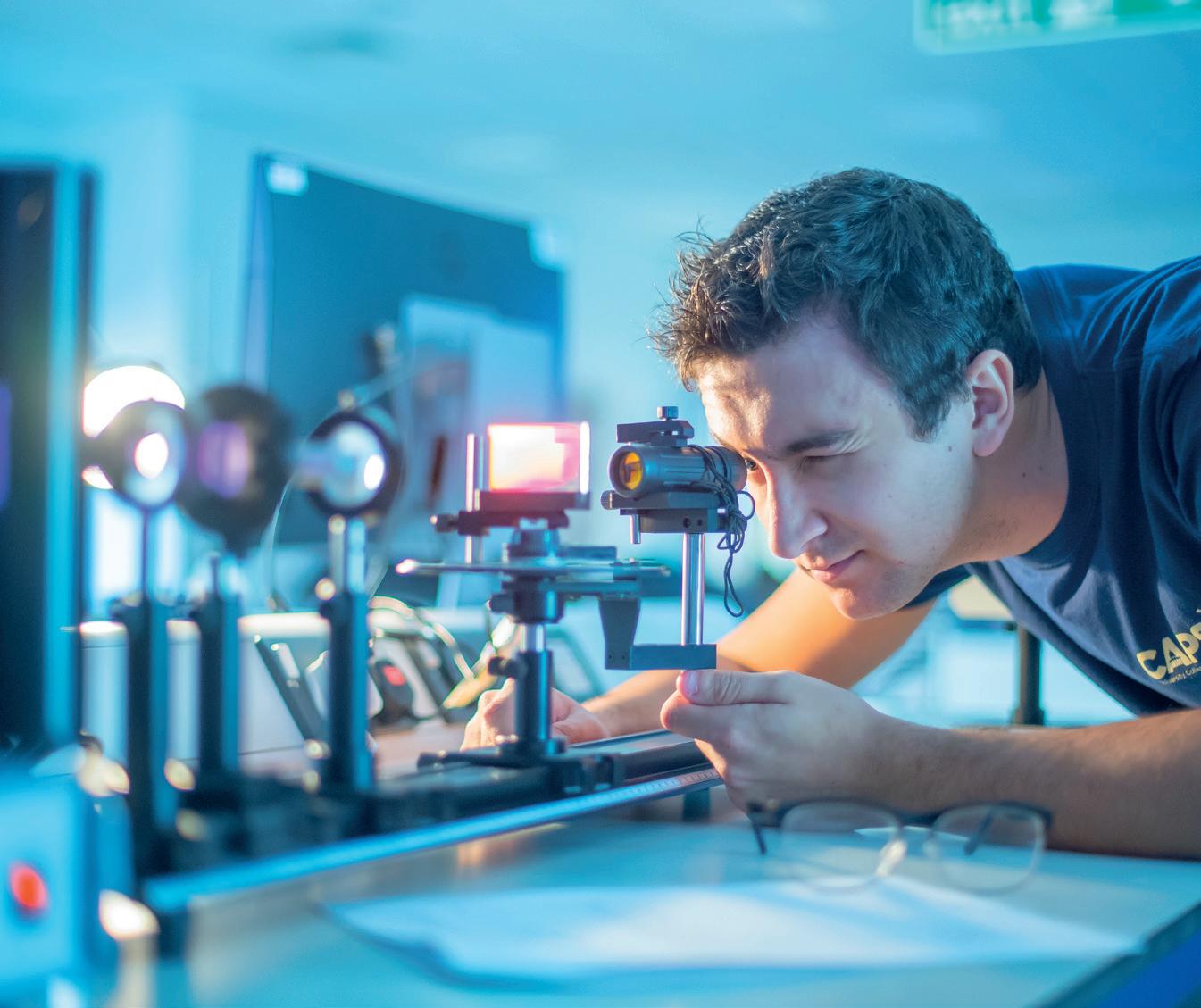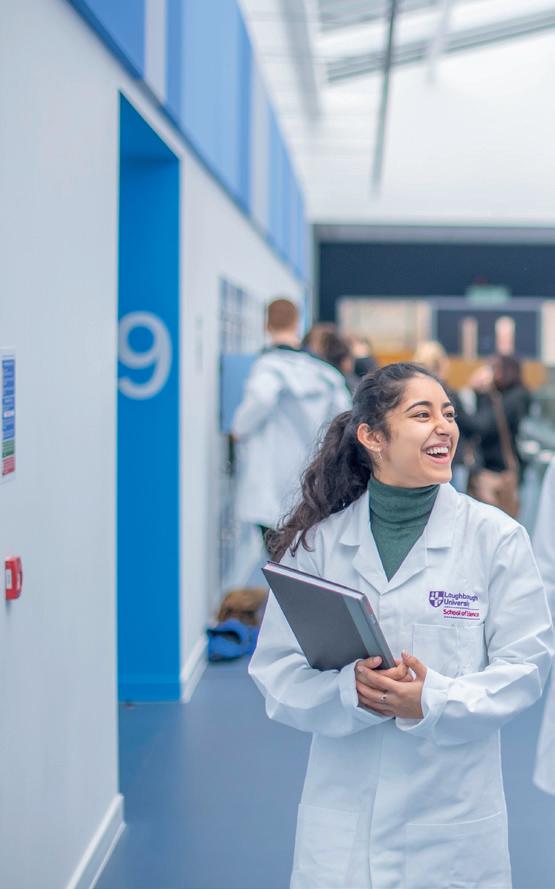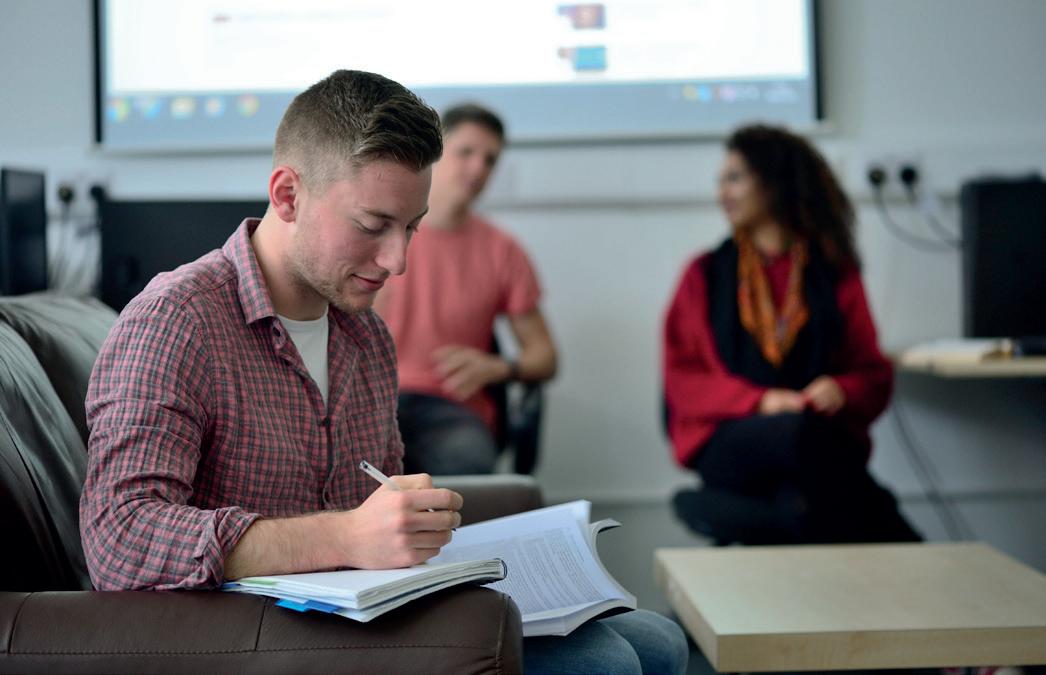
8 minute read
Social and Policy Studies
Why choose Social and Policy Studies at Loughborough? Whether it is crime, poverty and social exclusion or gender, race and discrimination; digital cultures and economy or health and reproduction; our degree courses enable you to understand and critically analyse the key social problems and processes in society. Guided by our team of expert scholars, our courses allow students to investigate the world around them by drawing on social theories and using cutting-edge methods to understand and respond to the contemporary challenges faced in times of uncertainty and change. Our courses are taught by academics who are leaders in their respective fields. This approach means our courses are underpinned by the latest developments in research and applied learning techniques. A tailored degree Whilst receiving a thorough training in your chosen subject, our courses allow you to study topics of interest from across the social sciences. Our students become versed in a broad range of current debates and learn to question and explain social issues from different perspectives. Teaching methods A mixture of lectures, practical classes and tutorials offer a range of learning experiences to ensure our students acquire a thorough grounding in social science disciplines, as well as advanced understanding in their chosen areas of interest. All our students gain advanced training in social research methods and learn to conduct their own research into topics that fascinate them. Placement year and study abroad All our courses offer the opportunity to complete a year on placement or studying at a partner university overseas. Our students secure placements in organisations from across the public and private sector. In the workplace they apply the theories and methods learnt during their course to real-world situations. Employability 93% of recent graduates were in employment and/or further study six months after graduating (DLHE 2016/17). By allowing our students to develop a range of specialist and transferable skills, our courses open doors to a wide range of professions and career pathways. Graduates from our courses are sought after for their insights into issues, policies and processes shaping society and flourish in roles that demand advanced level information handling and analytical skills. Previous students have graduated into entry level opportunities across the public, private and voluntary sectors, with careers in industry, education, health and social care, human resources, civil service, public relations, law and the criminal justice system to name but a few.
1ST IN UK FOR CRIMINOLOGY THE TIMES AND SUNDAY TIMES GOOD UNIVERSITY GUIDE 2020
1ST IN UK FOR STUDENT SATISFACTION IN SOCIOLOGY THE TIMES AND SUNDAY TIMES GOOD UNIVERSITY GUIDE 2020
4TH IN UK FOR SOCIOLOGY THE TIMES AND SUNDAY TIMES GOOD UNIVERSITY GUIDE 2020
Criminology BSc (Hons) DPS/DIntS*: 4 years full-time with placement year UCAS code: M900 BSc (Hons): 3 years full-time UCAS code: M901 Typical offers A level: ABB (General Studies accepted) IB: 34 (6,5,5 HL) BTEC Level 3 National Extended Diploma: DDM
Criminology and Sociology BSc (Hons) DPS/DIntS*: 4 years full-time with placement year UCAS code: L3M0 BSc (Hons): 3 years full-time UCAS code: L3M9 Typical offers A level: ABB (General Studies accepted) IB: 34 (6,5,5 HL) BTEC Level 3 National Extended Diploma: DDM
On this course you will develop a detailed understanding of the nature, scale and scope of crime and its causes. You will explore the criminal justice system and how it responds to crime, as well as the key factors relating to offender rehabilitation. The programme draws on both classic and contemporary approaches to crime prevention, as well as the impact of social problems such as poverty, inequality and social exclusion on criminal behaviour. The degree brings together the theories and research methods used to understand crime, deviance and inequality in the UK and beyond. Throughout the course you will explore issues of social justice and learn about the ways in which crime and criminal justice policy and practice can be used to support and protect, but also further marginalise, some of the most vulnerable groups in society. Year 1 Areas studied include introducing criminology, becoming a criminologist, crime and social welfare, understanding social policy, identities and inequalities, global, social, and cultural change and introduction to research methods. Year 2 Areas studied include criminological theory, the criminal justice system, operational policing, crime prevention and advanced research methods. Optional placement/study year Optional professional placement and/or overseas study. Final year Areas studied include youth justice, sex work and sex industries, rehabilitation and recovery and a researchbased criminology dissertation. Graduate destinations Our students go on to a wide variety of careers in the private, public and voluntary sectors. Some enter welfare-related careers such as probation and social work, while others join the police, the prison service, management training schemes, and the personnel departments of large companies. A number go on to do postgraduate study or teacher training. *Diploma in Professional/International Studies
This course combines two vibrant subjects to offer both a detailed understanding of crime, its causes and prevention and a broader knowledge of how societies are shaped by social forces related to gender and ethnicitybased discrimination, cultures, identities, globalization and inequality. The degree brings together core and advanced modules in criminology and sociology to give you a unique ability to analyse intersections of criminal justice and social change as it pertains to global processes of migration and new economies, as well as intimate identities, sense of belonging, health and consumption. This is an ideal course for those who have an interest in crime and social problems as well as broader structures, processes and cultures that shape our lives and societies. Year 1 Areas studied include introducing criminology, identities and inequalities, understanding social policy, global, social and cultural change, crime and social welfare, the sociological imagination, and introduction to research methods. Year 2 Areas studied include social theories, operational policing, crime prevention, the criminal justice system, criminological theory and advanced research methods. Optional placement/study year Optional professional placement and/or overseas study. Final year Areas studied include youth justice, rehabilitation and recovery, the individual and society, consumption, culture and everyday life and a research-based dissertation. Graduate destinations Recent graduate destinations include Deutsche Bank, Goldman Sachs, Saatchi, BBC, Sky, Vodafone, BUPA, Ministry of Justice, British Transport Police, NHS, National Autistic Society, National Offender Management Service, National Crime Service, HSBC, Macmillan Science and Education. *Diploma in Professional/International Studies
Sociology BSc (Hons) DPS/DIntS*: 4 years full-time with placement year UCAS code: L301 BSc (Hons): 3 years full-time UCAS code: L300 Typical offers A level: ABB (General Studies accepted) IB: 34 (6,5,5 HL) BTEC Level 3 National Extended Diploma: DDM
This course teaches students theories, methods and specialist knowledge needed to understand how identities, behaviours and lives are shaped by social, global and cultural processes and structures that give rise to inequalities and change. You will explore a variety of social phenomena, such as gender, social class and inequalities, race and racism, consumption, health, digital technologies, developing a detailed understanding of the changing social world. You will acquire practical social research methods skills including surveys, interviews and focus groups as well as visual methods and digital ethnography. Year 1 Areas studied include identities and inequalities, global, social and cultural change, sociological imagination, foundations in social sciences, and introduction to research methods. Year 2 Areas studied include social theories, globalisation and its consequences, digital lives and society and advanced research methods. Optional placement/study year Optional professional placement and/or overseas study. Final year Areas studied include the individual and society, gender, sex and society and consumption, culture and everyday life and a research-based dissertation. Graduate destinations Recent graduate destinations include Accenture, Deutsche Bank, Goldman Sachs, BBC, Sky, Vodafone, BUPA, Ministry of Justice, British Transport Police, NHS, National Autistic Society, National Offender Management Service, National Crime Service, HSBC, Macmillan Science and Education.
*Diploma in Professional/International Studies
Sociology and Media BSc (Hons) DPS/DIntS*: 4 years full-time with placement year UCAS code: PL34 BSc (Hons): 3 years full-time UCAS code: PL33 Typical offers A level: ABB (General Studies accepted) IB: 34 (6,5,5 HL) BTEC Level 3 National Extended Diploma: DDM
This course combines two vibrant subjects providing students with a detailed sociological knowledge of inequalities, identities and social change, with a cutting-edge understanding of the role of media and communication in contemporary society. By providing a thorough training in social problems, theories and methods, students will learn to examine and explain complex social issues related to inequality, identity and social structure. Students also explore the role played by the media in representing and recreating social issues and learn about key developments in digital media, press, film, broadcasting and advertising. Year 1 Areas studied include introduction to communication and media studies, sociological imagination, identities and inequalities, critical viewings, global, social and cultural change, language and society and introduction to research methods. Year 2 Areas studied include media and social change, digital lives and society, social theories, media identity and inequality and advanced research methods. Optional placement/study year Optional professional placement and/or overseas study. Final year Areas studied include contemporary media debates, digital media and society, the individual and society, consumption, culture and everyday life and a research based dissertation. Graduate destinations Career paths include journalism, campaign management, corporate communications, digital marketing, human resources, public administration, teaching and research.
*Diploma in Professional/International Studies

Royston BSc Sport and Exercise Science

Courses
Sport and Exercise Science 200 Sport, Coaching and Physical Education 200 Sport Management 203 Foundation Studies 134
198 You may also be interested in… Biological Sciences 82 English and Sport Science 130 Geography and Sport Science 143 Human Biology 82 Mathematics and Sport Science 159 Psychology 188 Sports Technology 168 Sport and Exercise Psychology 191










